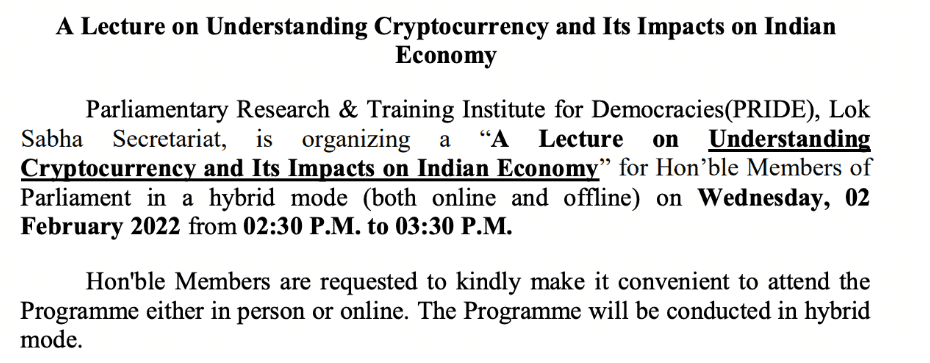The call for regulating cryptocurrency is increasing in India and other nations. However, the Cryptocurrency and Regulation of Official Digital Currency Bill do not figure in the 15 bills that the government will discuss in the next session, reports cointelegraph.com.
The agenda before the Indian Parliament does not consider banning digital assets but instead talks about crypto training sessions. The bulletin, which deals with the schedule for India’s lower house of Parliament, includes an understanding of cryptocurrency and its economic impact.
A Monday publication of the Lok Sabha, the Parliamentary Research and Training Institute for Democracies group within the government will conduct a training session for lawmakers and educate them about the finer aspects of cryptocurrencies. There is no schedule for banning crypto and digital assets before the Parliament.
Earlier publications had hinted that the government could bring forward a bill proposing banning all private cryptocurrencies in India under the ambit of The Cryptocurrency and Regulation of Official Digital Currency Bill. However, the bill will not include assets to promote cryptocurrency’s underlying technology and its uses.
The Indian Supreme Court had overturned an earlier bill that sought to ban all forms of crypto in 2020. The proposed legislations often popped out on the Parliament’s agenda from time to time. The Reserve Bank of India is also trying to introduce a CBDC or Central Bank Digital Currency or a Digital rupee.
India to regulate, not ban, crypto: Cabinet documents.
Blockchain powered Digital Rupee by @RBI will be introduced 2022-23 in India
Great news! More crypto adoption on the way 🚀
Glad to know that RBI will now start getting deeper into crypto. Hope to see banks start getting involved with crypto industry as well#IndiaWantsCrypto
advertisement— Nischal (WazirX) ⚡️ (@NischalShetty) February 1, 2022
Reports suggest that lawmakers seek different legislative paths to tackle India’s ever-burgeoning cryptocurrency sector. It includes taking harsh measures like altogether banning crypto trade to taxing crypto assets in another way. In October, officials from the Finance Ministry reportedly considered implementing a legal framework to treat crypto more like a commodity than a currency.
The Budget Session officially started Monday, with both Houses in the Indian Parliament planning to meet in separate shifts to fight the spread of COVID-19. The session is expected to run until May.
Taxation of digital assets: crypto asset transfers to be taxed at 30%. No deductions for computing income except acquisition cost. Losses cannot be set off against other income. Crypto gifts will also be taxed.
Big for crypto in India. #Budget2022 #BudgetSession2022
— Rajeev Mantri (@RMantri) February 1, 2022


